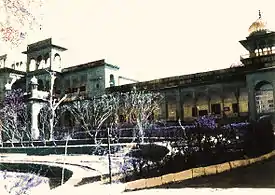Dholpur State
Dhaulpur State or Dholpur State was a kingdom of eastern Rajasthan, India, which was founded in AD 1806 by a Hindu Jat Rana Kirat Singh of Dhaulpur, Ruler.[1][2][3] After 1818, the state was placed under the authority of British India's Rajputana Agency. The Ranas ruled the state until the independence of India in 1947, when the kingdom was merged with the Union of India.
| Dholpur State धौलपुर रियासत | |||||||
|---|---|---|---|---|---|---|---|
| Princely State of British India | |||||||
| 1806–1949 | |||||||
 Flag | |||||||
 Dholpur State in the Imperial Gazetteer of India | |||||||
| Area | |||||||
• 1901 | 3,038 km2 (1,173 sq mi) | ||||||
| Population | |||||||
• 1901 | 250,000 | ||||||
| History | |||||||
• Established | 1806 | ||||||
| 1949 | |||||||
| |||||||
| Today part of | Rajasthan, India | ||||||


Dholpur princely state was located in the present-day state of Rajasthan. The state had an area of 3,038 km2 (1,173 sq mi), and an estimated revenue of Rs.9,60,000.[4]
The former chief minister of Rajasthan, Vasundhara Raje, was a member of the erstwhile ruling family of Dholpur as she was married to His Highness Maharaja Hemant Singh before getting divorced.
History
Very little is known of the early history of the state. According to tradition a predecessor state was established as Dhavalapura. In 1505 neighboring Gohad State of Rana Jats was founded and between 1740 and 1756 Gohad occupied Gwalior Fort. From 1761 to 1775 Dholpur was annexed to Bharatpur State and between 1782 and December 1805 Dholpur was again annexed by Gwalior. On 10 January 1806 Dholpur became a British protectorate and in the same year the Ruler of Gohad merged Gohad into Dholpur.[5][6]
The last ruler of Dholpur signed the instrument of accession to the Indian Union on 7 April 1949 and the state was merged in Matsya Union.[7]
Rulers
The rulers of the state were Jats and were styled Maharaja Rana from 1806 onwards.[5] They were entitled to a 15-gun salute.
Rulers of Gohad (title Rana)
- 1699 – 1713: Gaj Singh (d. 1713)
- 1713 – 1717: Jaswant Singh (d. 1717)
- 1717 – 1756: Bhim Singh Rana (d. 1756)
- 1756 – 1757: Girdhar Pratap Singh (d. 1757)
- 1757 – 1784: Chhatar Singh (d. 1788) (personal style Maharaj Rana from 1771)
- 1784 – 1804: Interregnum
- 1804 – 1806: Kirat Singh (b. 1763 – d. 1836)
Rulers of Dholpur (title Maharaja Rana)
- 1806 – 21 April 1836: Kirat Singh (s.a.)
- 1836 – Dec 1836: Pohap Singh (d. 1836)
- Dec 1836 – 7 February 1873: Bhagwant Singh (b. 1824 – d. 1873) (from 2 June 1869, Sir Bhagwant Singh)
- 7 Feb 1873 – 20 July 1901: Nihal Singh (b. 1863 – d. 1901)
- 7 Feb 1873 – 1884: Maharani Sateha Devi (b. 1845 – d. 1888) Bhawa (f) – Regent
- 20 Jul 1901 – 29 March 1911: Ram Singh (b. 1883 – d. 1911) (from 1 January 1909, Sir Ram Singh)
- 20 Jul 1901 – Mar 1905: .... – Regent
- 29 Mar 1911 – 15 August 1947: Udai Bhan Singh (b. 1893 – d. 1954) (from 1 January 1918, Sir Udai Bhan Singh)
- 29 Mar 1911 – 9 October 1913: .... – Regent
The descendants of Maharaj Udai Bhan Singh and Maharaj Nihal Singh are still carrying on their family legacy.
- Dushyant Singh S/o Maharaj Hemant Singh and Vasundhra Raje Scindia
- Veer Virender Singh S/o Maharaj Nihal Singh
- Keshav Singh Rana S/o Maharaj Nihal Singh married Kunwarani Kartar Kaur
- Kunwar Vikram Rana S/o Rana Upender Singh married Kunwarani Harman Garcha
Kunwar Vikram Rana is the youngest member of the erstwhile ruling family, great grandson of Maharaj Nihal Singh.
References
- John Zubrzycki (2012). The Mysterious Mr Jacob. Random House India. p. 3. ISBN 9788184003369.
- "Dholpur: History and Places".
- "Dholpur online".
- https://dsal.uchicago.edu/reference/gazetteer/pager.html?objectid=DS405.1.I34_V11_330.gif
- Princely States
- Gazetteer of India, v. 11, p. 323.
- Dholpur Princely State (15 gun salute)
External links
 Media related to Dholpur State at Wikimedia Commons
Media related to Dholpur State at Wikimedia Commons- Genealogy of the rulers of Dholpur
- Princely States of India A-J